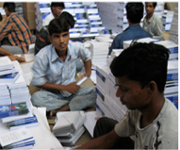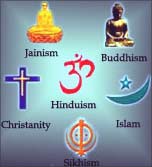By Michael Ireland
Special Correspondent, ASSIST News Service
CAIRO, EGYPT (ANS) -- Several blasphemy cases moved forward this week in Egypt while President Morsi defended curbing free speech in an address Wednesday at the United Nations, according to Kristen Chick, reporting for The Christian Science Monitor (www.m.csmonitor.com )
The Monitor says an Egyptian court upheld a six-year prison sentence Sept.27 for an Egyptian Christian charged with insulting Islam and the president, just a day after the opening hearing in the trial of another Egyptian man accused of insulting the religion.
The Monitor reports that an Egyptian rights group also announced Thursday that it would ask Egypt's highest appeals court to consider the case of an Egyptian Shia man convicted of desecrating a mosque. And, in a rare case, prosecutors this week brought charges of defaming Christianity against a Muslim who ripped a Bible.
The Monitor states the flurry of developments in blasphemy-related cases comes in the wake of the uproar, in Egypt and across the Muslim world, over an American-made anti-Islam YouTube clip.
It reports: "The protests and anger over the video have strengthened the push for an anti-blasphemy clause in Egypt's new constitution. Rights activists say such a constitutional clause, like Egypt's current laws criminalizing insults to religion, limit freedom of expression and are often used to target minorities and those with unpopular views."
 |
Egyptian President Morsi (Photo courtesy EPA via Google Images).
|
Mob Accusations Leveled
The Monitor goes on to cite several recent cases.
Alber Saber, whose case began Wednesday, was arrested during the week of protests against the American film.
The Monitor says that after an angry mob gathered outside his house, accusing him of burning the Quran and insulting Islam, he called police, says his lawyer, Ahmed Ezzat. Instead of confronting the mob, they arrested Mr. Saber. The prosecutor who conducted the investigation repeatedly asked Saber about his religious beliefs, and played a video found on a CD in Saber's home in which Saber, whose family is Christian, questions the meaning of religion.
The Monitor says initial reports said Saber had posted the "Innocence of Muslims" YouTube clip on his Facebook page, but Mr. Ezzat says those reports were false. While he was in jail, police incited other prisoners to attack Saber by telling them he was connected to the "Innocence of Muslims" film, says Ezzat.
The Monitor goes on to say the Christian man whose conviction was upheld Thursday was sentenced to six years in prison for posting pictures on Facebook that were deemed offensive to Islam. He was also convicted for insulting President Morsi.
"He's now going to spend six years in jail for talking, for speech basically," said Amr Gharbeia, of the Egyptian Initiative for Personal Rights (EIPR).
According to the Monitor, at the hearing Thursday in the southern Egyptian city of Sohag, three lawyers sent to represent the man were threatened and intimidated in court, says Mr. Gharbeia. People in the courthouse called them infidels, and shouted threats at them. At one point the three were separated, and they could not leave the courthouse without a security escort, says Gharbeia.
EIPR Thursday announced it had filed an appeal with the Court of Cassation, the highest appeals court in Egypt, to take up the case of an Egyptian Shia man who was convicted of desecration.
From a Nile Delta town, he was arrested earlier this year when he prayed in a mosque in a way that is traditional in Shia Islam. The "desecration" took place when residents entered the mosque with weapons because they were angry with the way he prayed. "He's being punished for someone else's acts," says Gharbeia.
The Monitor explained that Shia Muslims are repressed and marginalized in Egypt, where they make up a tiny percentage of the population.
Christianity Also Defamed
The Monitor also explained that Egypt's blasphemy law is almost exclusively used to prosecute people for insulting Islam, and is often used against Christians, though it officially protects "heavenly religions," understood as Islam, Christianity, and Judaism, from insult.
The website further states that this week, in a rare case, prosecutors brought charges of defaming Christianity against a Muslim preacher who tore a copy of the Bible outside the US embassy during protests against the YouTube clip.
The Monitor says the self-styled preacher and television personality, known as Sheikh Abu Islam, was released until his trial, while Saber remains in prison during his case.
The Monitor also says Mr. Islam's son and a journalist who interviewed him after the protest were also charged, for reasons that remain unclear.











